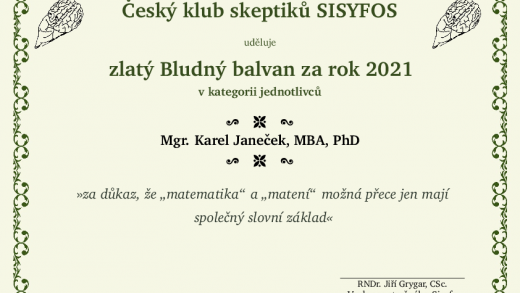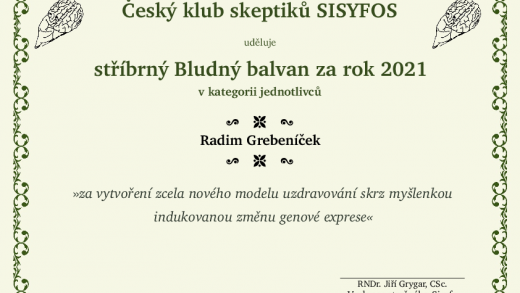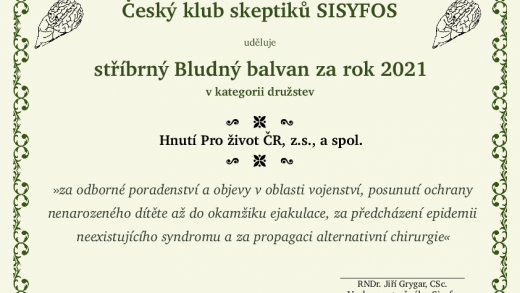PRAGUE, SEPTEMBER 7-9, 2001
Dear Colleagues, Ladies and Gentlemen,
Let me begin my brief address with telling you what is a common denominator of all of us present here today. I believe that it is an interest in the fate of mankind. Is this interest really necessary? I think so and I feel it very strongly.
Especially in the early stage of the 21st century, serious worries connected with our civilization have been intensifying and can be divided into two groups. The first group is related to some negative features of the general morale. A really devastating influence lies in the fact that some people engaged in political life are contaminated by corruption and that lying is a component of their everyday policy. Another bad feature is connected with an enormous greediness for money on the part of some individuals: organized crime represents a limiting case. Needless to say it is a tragedy when profit is the only criterion of success of newspapers or, in general, of the media. Unfortunately even some activities, which served in the past for the strengthening of positive moral features, like sports, are nowadays rather frequently debased by frauds, intended to guarantee success at any price. Let me conclude this paragraph by mentioning a decline of religious feeling, the reduced influence of the Church and the increasing role of sects, some of which assume pathological characteristics.
The second group of worries is connected with the confrontation between education and lack of education, between science and pseudoscience, and between rationalism and irrationalism These confrontations are underestimated by some people, which could have really serious consequences. The number of grave difficulties humankind will face during the 21st century is, undoubtedly, significant. Let me illustrate this point by two instances: energy resources and the energy supply and influence of new or resurgent bacterial, viral, and other types of diseases.
In the realm of energy we do commit a double-crime. We burn fossil fuels, which should rather be considered as extremely valuable raw-materials for the future of the chemical industry. The damage caused by burning is irreversible and enormous. Not only that: besides water also carbon dioxide is formed. The greenhouse effect is fun only for some poorly educated politicians. Nuclear and plasma physicists together with sophisticated engineers have a chance to make a real step forward in obtaining powerful new or improved energy resources. Political demagoguery and semi-educated representatives of some ecological movements are of no use. Remarkably enough, public radio and TV rather frequently prefer, when discussing these critical subjects, semi-educated amateurs and not fully qualified scientists and engineers.
Quite a similar tendency is obvious in connection with health problems. Unfortunately it is not granted that scientific medicine will be able rapidly and efficiently enough to control problems with, e.g., steadily increasing allergy problems and tumours; needlessly always having to speak about AIDS and mad-cow disease. But there is a good chance that with sufficient financial support medicine will solve the problems. However, without an educated public it would be a too difficult task. And just here, the media cause frequently serious damage when pretending democracy and objectivity by making direct comparison between established, recognized scientific medicine and what they call as alternative medicine. Of course the label ˛alternative medicine˛ is nonsense. It is fair to admit, however, that some physicians, suffering from shortage of time, do not address patients patiently enough. Such an approach catalytically strengthens the publics’ faith in strange healers and other charlatans.
The movement of Skeptics has represented for years always a decent but rather strong support of rationalism in its never-ending battle with irrationalism. We should never forget that the opponents are tenacious in loving absurdities and are ready to defend them by all means. The same is true about those adherents of irrationality who earn on that basis lot of money.
I wish to close this address by saying that such a congress as this, which is just beginning, is valuable, useful, and rewarding. But all of us should never forget even for a second that without a great, enthusiastic, and permanent effort in informing the public about our activities, all our efforts would be in vain.
Rudolf Zahradník
Honorary President
The Academy of Sciences of the Czech Republic, Praha
REFLECTIONS ON CSICOP ON ITS 25th ANNIVERSARY
"It is amazing really when you think about it: what the ramifications can be, at least for me, from an action that basically originated as an afterthought." This is the first sentence describing how Barry Karr came to be involved with the Committee for the Scientific Investigation of Claims for the Paranormal and the World Skeptics movement. In his talk, subtitled "Never a Dull Moment," Karr will talk about some of the personal experiences and highlights of his years associated with the organization and discuss some behind-the-scenes activities that don't make it into the pages of the Skeptical Inquirer magazine.
Barry Karr,
CSICOP, Amherst, NY 14226, USA
E-mail: Skeptinq@aol.com
photos from the congress session
Dear Colleagues, Ladies and Gentlemen,
Let me begin my brief address with telling you what is a common denominator of all of us present here today. I believe that it is an interest in the fate of mankind. Is this interest really necessary? I think so and I feel it very strongly.
Especially in the early stage of the 21st century, serious worries connected with our civilization have been intensifying and can be divided into two groups. The first group is related to some negative features of the general morale. A really devastating influence lies in the fact that some people engaged in political life are contaminated by corruption and that lying is a component of their everyday policy. Another bad feature is connected with an enormous greediness for money on the part of some individuals: organized crime represents a limiting case. Needless to say it is a tragedy when profit is the only criterion of success of newspapers or, in general, of the media. Unfortunately even some activities, which served in the past for the strengthening of positive moral features, like sports, are nowadays rather frequently debased by frauds, intended to guarantee success at any price. Let me conclude this paragraph by mentioning a decline of religious feeling, the reduced influence of the Church and the increasing role of sects, some of which assume pathological characteristics.
The second group of worries is connected with the confrontation between education and lack of education, between science and pseudoscience, and between rationalism and irrationalism These confrontations are underestimated by some people, which could have really serious consequences. The number of grave difficulties humankind will face during the 21st century is, undoubtedly, significant. Let me illustrate this point by two instances: energy resources and the energy supply and influence of new or resurgent bacterial, viral, and other types of diseases.
In the realm of energy we do commit a double-crime. We burn fossil fuels, which should rather be considered as extremely valuable raw-materials for the future of the chemical industry. The damage caused by burning is irreversible and enormous. Not only that: besides water also carbon dioxide is formed. The greenhouse effect is fun only for some poorly educated politicians. Nuclear and plasma physicists together with sophisticated engineers have a chance to make a real step forward in obtaining powerful new or improved energy resources. Political demagoguery and semi-educated representatives of some ecological movements are of no use. Remarkably enough, public radio and TV rather frequently prefer, when discussing these critical subjects, semi-educated amateurs and not fully qualified scientists and engineers.
Quite a similar tendency is obvious in connection with health problems. Unfortunately it is not granted that scientific medicine will be able rapidly and efficiently enough to control problems with, e.g., steadily increasing allergy problems and tumours; needlessly always having to speak about AIDS and mad-cow disease. But there is a good chance that with sufficient financial support medicine will solve the problems. However, without an educated public it would be a too difficult task. And just here, the media cause frequently serious damage when pretending democracy and objectivity by making direct comparison between established, recognized scientific medicine and what they call as alternative medicine. Of course the label ˛alternative medicine˛ is nonsense. It is fair to admit, however, that some physicians, suffering from shortage of time, do not address patients patiently enough. Such an approach catalytically strengthens the publics’ faith in strange healers and other charlatans.
The movement of Skeptics has represented for years always a decent but rather strong support of rationalism in its never-ending battle with irrationalism. We should never forget that the opponents are tenacious in loving absurdities and are ready to defend them by all means. The same is true about those adherents of irrationality who earn on that basis lot of money.
I wish to close this address by saying that such a congress as this, which is just beginning, is valuable, useful, and rewarding. But all of us should never forget even for a second that without a great, enthusiastic, and permanent effort in informing the public about our activities, all our efforts would be in vain.
Rudolf Zahradník
Honorary President
The Academy of Sciences of the Czech Republic, Praha
REFLECTIONS ON CSICOP ON ITS 25th ANNIVERSARY
"It is amazing really when you think about it: what the ramifications can be, at least for me, from an action that basically originated as an afterthought." This is the first sentence describing how Barry Karr came to be involved with the Committee for the Scientific Investigation of Claims for the Paranormal and the World Skeptics movement. In his talk, subtitled "Never a Dull Moment," Karr will talk about some of the personal experiences and highlights of his years associated with the organization and discuss some behind-the-scenes activities that don't make it into the pages of the Skeptical Inquirer magazine.
Barry Karr,
CSICOP, Amherst, NY 14226, USA
E-mail: Skeptinq@aol.com
photos from the congress session







